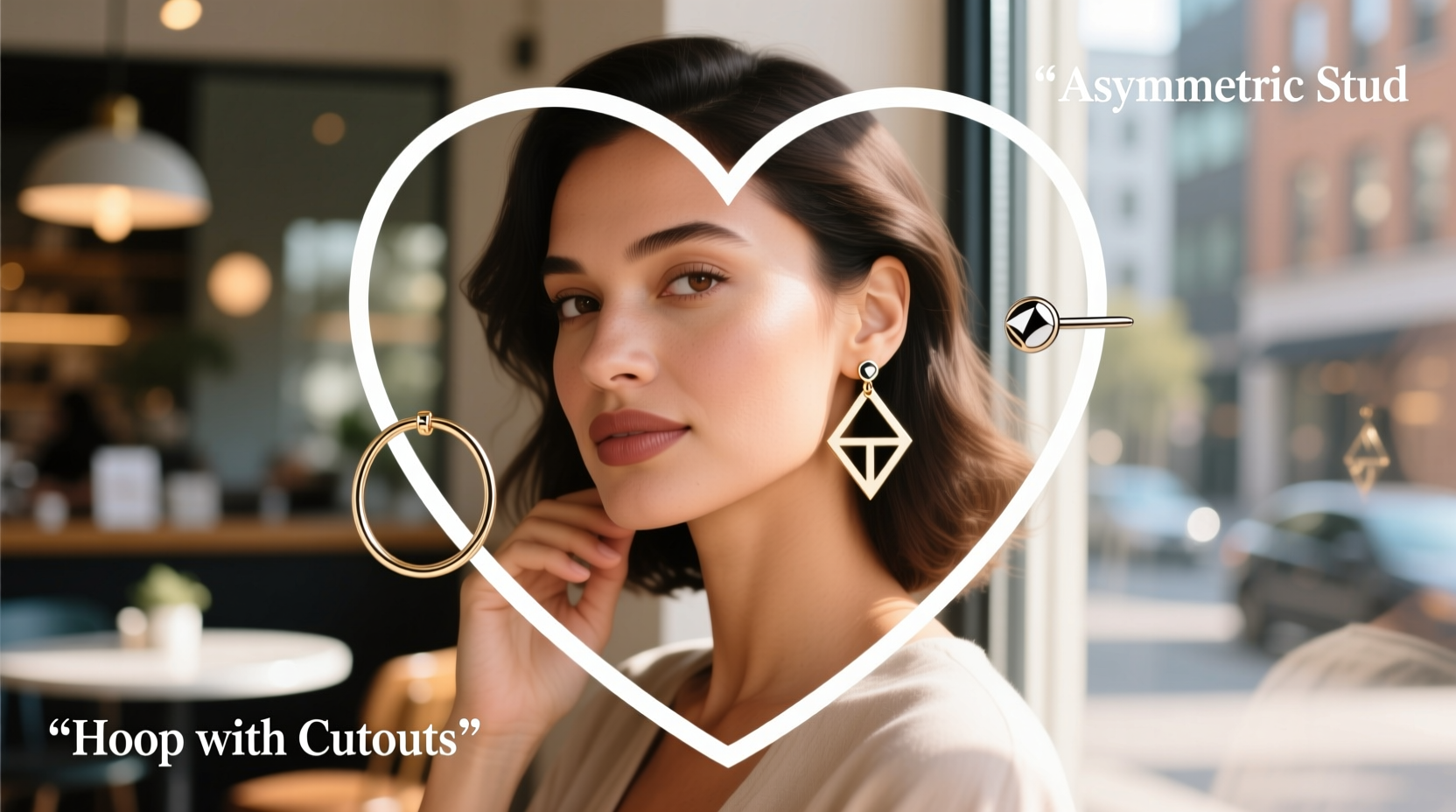Selecting the perfect pair of earrings goes beyond following trends or matching outfits. The most flattering designs take into account one crucial detail: your face shape. When styled intentionally, earrings can enhance your natural features, balance proportions, and elevate your overall look. Understanding how different earring styles interact with facial structure transforms accessorizing from guesswork into a strategic expression of personal style.
With endless options—from hoops and studs to chandeliers and huggies—knowing which shapes complement your face ensures you wear earrings that don’t just catch attention, but also harmonize with your bone structure. Whether you're drawn to minimalist gold drops or bold statement pieces, aligning your choices with your face shape maximizes impact and confidence.
Understanding Face Shapes and Earrings

Facial geometry plays a pivotal role in how jewelry is perceived. Certain earring styles elongate the face, others widen it subtly; some draw focus to the eyes, while others highlight cheekbones or jawlines. Recognizing your face shape allows you to use earrings as tools for subtle enhancement rather than random decoration.
The six primary face shapes are:
- Oval – Balanced proportions, slightly longer than wide
- Round – Equal width and length, soft jawline
- Square – Strong jaw, broad forehead, angular features
- Heart – Wider at the forehead, tapering to a narrow chin
- Diamond – Narrow forehead and jaw, wide cheekbones
- Oblong – Longer than average, with even width throughout
Each benefits from specific earring silhouettes that either contrast or complement its natural lines. The goal isn't to mask your shape, but to accentuate its strengths.
Earrings That Flatter Each Face Shape
Once you’ve identified your face shape, selecting earrings becomes more intuitive. Below is a guide tailored to each type, explaining why certain styles work and which ones to approach with caution.
| Face Shape | Best Earring Styles | Styles to Avoid | Why It Works |
|---|---|---|---|
| Oval | Studs, hoops, drops, chandeliers | Few restrictions | Versatile proportions allow experimentation without disrupting balance. |
| Round | Long dangles, geometric drops, vertical huggies | Large circular hoops, small studs | Vertical lines create the illusion of length, countering roundness. |
| Square | Round hoops, teardrop shapes, curved drops | Rigid angular designs | Soft curves offset strong jawlines and add femininity. |
| Heart | Chandelier, button studs, lower-hanging oval designs | Top-heavy or very wide styles | Balances wider forehead by adding volume near the chin. |
| Diamond | Hoops, solitaire drops, earrings with top or bottom emphasis | Narrow linear styles | Draws attention to eyes and lips, softening prominent cheekbones. |
| Oblong | Short hoops, studs, clustered designs, horizontal elements | Long, slender drops | Adds width to prevent an overly elongated appearance. |
Step-by-Step Guide: Choosing Your Ideal Earrings
Follow this five-step process to consistently pick earrings that enhance your look:
- Identify your face shape using the mirror method or consult a stylist for confirmation.
- Assess your wardrobe and lifestyle—do you lean toward minimalism, glamour, or edgy fashion? This helps narrow style preferences within flattering categories.
- Consider earlobe placement and size. Low-set lobes benefit from shorter drops; high lobes can carry longer styles gracefully.
- Test proportions. Hold potential earrings up to your face in natural light. Do they visually balance your features?
- Start with one standout pair per category (e.g., one elegant drop, one bold hoop) and build from there.
“The right earring doesn’t just decorate—it dialogues with the face. It’s about proportion, movement, and where you want the eye to rest.” — Lena Torres, Celebrity Stylist & Jewelry Curator
Real-Life Example: Transforming Style with Strategic Selection
Take Sarah, a marketing executive with a square face who always felt hesitant about wearing earrings. She gravitated toward small studs, believing larger pieces would exaggerate her strong jaw. After a consultation, she tried a pair of medium-sized round gold hoops. The soft circular shape framed her face gently, drawing attention to her smile instead of her angles. Within days, colleagues commented on how “softer” and polished she looked. Sarah didn’t change her makeup or hairstyle—only her earring choice. This shift boosted her confidence in client meetings and social events alike.
Her experience underscores a key truth: accessories aren’t minor details. They’re silent communicators of intention and self-awareness.
Pro Tips for Maximizing Impact
Additional strategies include:
- Mix metals thoughtfully. If your skin tone suits rose gold, let that dominate—even in mixed sets.
- Match earring finish to your outfit’s texture. Matte earrings pair well with knits; shiny finishes elevate silk or satin.
- Scale matters. Petite faces suit delicate designs; bolder features can carry oversized styles without being overwhelmed.
Essential Checklist Before Buying
Before purchasing any new pair of earrings, run through this checklist:
- ✅ Does this style complement my face shape based on proven guidelines?
- ✅ Is the weight comfortable for all-day wear?
- ✅ Are the materials hypoallergenic if I have sensitive ears?
- ✅ Will I wear this with at least three different outfits?
- ✅ Does it align with my daily activities (e.g., office-safe, workout-friendly)?
- ✅ Can it transition from day to night with ease?
Frequently Asked Questions
Can I wear trendy styles if they don’t match my face shape?
You can—but modify them. If a trending linear bar earring doesn’t suit your oblong face, opt for a shorter version or pair it with a textured stud above to break up the line. Adaptation beats strict adherence.
Do glasses affect how earrings should be chosen?
Yes. Large frames add volume to the upper face, so those with heart or diamond shapes may want to keep earrings moderate in size. Conversely, small glasses paired with bold earrings can create striking balance.
How do I know if an earring is too big?
If the earring extends beyond the bottom of your jawline or visually overwhelms your facial features, it’s likely too large. A good rule: the lower edge should not go past the widest part of your face unless intentionally creating drama.
Final Thoughts: Elevate Your Expression
Mastering trendy earrings isn’t about chasing every viral design. It’s about curating a collection that reflects both current style and timeless understanding of your unique beauty. When you select earrings with intention—considering face shape, proportion, and personal narrative—you turn accessories into extensions of identity.
Start today: pull out your earring collection and evaluate each pair through the lens of fit, function, and flattery. Keep what serves you, rehome what doesn’t, and invest in pieces that honor both trend and truth.









 浙公网安备
33010002000092号
浙公网安备
33010002000092号 浙B2-20120091-4
浙B2-20120091-4
Comments
No comments yet. Why don't you start the discussion?